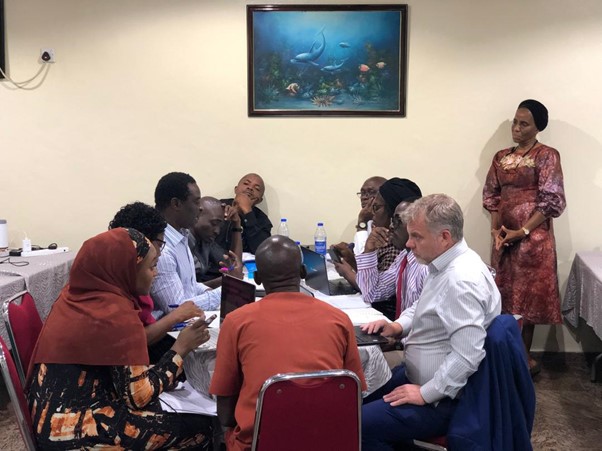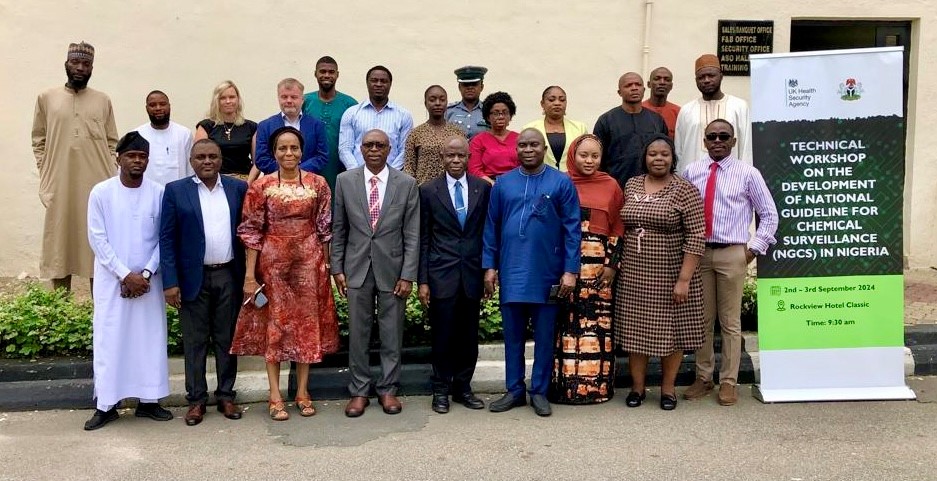
The UK Health Security Agency’s International Health Regulations Strengthening Project (IHR-SP) has collaborated with Nigerian partners to develop the country’s first national guidelines for chemical event surveillance. These guidelines will improve Nigeria’s capability to identify, report and respond to chemical incidents, protecting public health and fulfilling international health regulation commitments.
The Federal Ministry of Health in collaboration with stakeholders from the Nigerian National Committee on Chemical Surveillance and Emergency System (NCCSES) led this initiative with technical support from the UKHSA IHR-SP. The World Health Organization benchmarking tool and Joint External Evaluations have consistently identified chemical surveillance systems as a priority for strengthening national chemical event preparedness. Effective surveillance enables rapid response to incidents, supports environmental epidemiology, aids diagnosis and treatment, and helps identify emerging hazards affecting public health. As such, the development of chemical event surveillance tools and the national surveillance guidelines has been an ongoing objective of the NCCSES.
Multi-disciplinary development of surveillance requirements
The guidelines were developed through a collaborative process involving multi-sectoral agencies. Two technical workshops were facilitated by UKHSA IHR-SP in Nigeria during September and November 2024.
The first workshop brought together authorities drawn from the NCCSES, including Nigeria Centre for Disease Control and Prevention, Federal Ministry of Health, Ministry of Environment, Customs, National Food and Drugs Administration and Control, and experts from occupational health and academia. A series of guided questions were developed, encouraging stakeholders to identify gaps in chemical surveillance, and providing an opportunity to discuss, propose and agree solutions as a multi-agency group. The discussions and exchange of knowledge created a shared understanding of the chemical events data gathered from different institutions in Nigeria and highlighted the need for collaborative working to implement identified surveillance approaches.
Development of the Guidelines
Using outputs from the first workshop, guidelines were drafted for a review and validation workshop which took place in Ado, Nasarawa in November 2024. Stakeholders from multi-disciplinary partners reviewed, amended and finalised the draft guidelines line-by-line through detailed discussions and break out groups. The content of the guidelines includes:
- Background on chemical events in Nigeria
- Roles and responsibilities of different ministries, departments and agencies
- Current surveillance methodologies
- Identification and location of current datasets
- Development of alert thresholds for priority chemicals in different media e.g. air, water and soil, pertinent to Nigeria
- Proposed linkages between local, state and national stakeholders
- Potential development of data storage and sharing requirements and how this could be linked to incident response protocols.
At the end of the workshop, the document was validated by participating agencies and is scheduled to be launched officially in July 2025. The workshops successfully fulfilled the NCCSES objective to develop surveillance guidelines and secured multi-agency agreement to develop and adopt a surveillance system in Nigeria.
Putting the guidelines into practice
Following the launch the focus will shift to implementation of the National Guidelines for Chemical Events Surveillance, with mechanisms being developed for improved data sharing and reporting of chemical events across agencies with associated training and capacity building. The IHR-SP has also facilitated the development of factsheets for 15 key priority chemicals of public health importance including pesticides, heavy metals and toxic alcohols which will support the implementation process.
Useful Resources
Related Articles
-
Building future successes in Ethiopia’s Chemical, Biological, Radiological and Nuclear (CBRN) Performance with collaborative Annual Review meeting
BY IHR -
Enhancing Public Health across our partner countries with Chemical Hazards online training
BY IHR -
Strengthening Ethiopia’s CBRN Surveillance and Response Capabilities through ‘training of trainer’ workshop
BY IHR -
IHR-SP partners with Nigeria CDC to strengthen chemical events responses following heavy metal poisonings
BY IHR -
Collaboration for the Cambodian multisector response guidance to chemical events
BY Inneke Suhanda, Meghan Cook, Ahmed Razavi


Please Sign in (or Register) to view further.